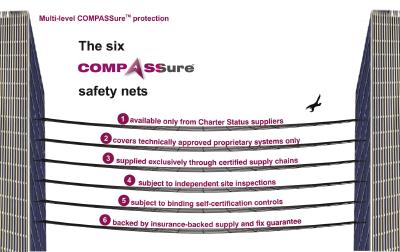A low-risk approach to risk management

Fig 1: COMPASSure provides risk control with multi-level protection.
=
low risk + low claims + low premiums
=
COMPASSure As well as removing unnecessary risk and costs from the construction system, COMPASSure can also considerably reduce the complexity involved in managing a construction project. For example, project managers can easily find and select the best suppliers, relying on their COMPASS credentials to ensure an embedded partnering culture and depending on the system’s inherent control systems to literally guarantee a technically compliant result. Zero-cost to the client Although the policy-holding system provider is responsible for paying the insurance premium and the scheme compliance costs, the system has been designed to be self-financing, with no added costs passed on to the client. This is possible because the scheme triggers some very real savings and commercial benefits for the system provider that offset the outlays incurred. So, rather than adding to the cost of construction, the COMPASSure system can actually reduce it. It does this in two ways. 1. By taking significant costs OUT of the system. These costs are the substantial ‘hidden’ costs incurred by system providers in working the ‘traditional’ way, including expensive specification protection measures, costly tendering and pre-qualification processes, avoidable claim/litigation defence expenditure etc. 2. by advancing true supply-chain integration that results in lasting, mutually beneficial relationships providing ‘good’ regular business and repeat orders, economies of scale and standardisation, transactional savings and earlier project involvement These benefits translate directly into higher turnover, higher profits and, of course, a readiness for the system provider to shoulder the costs and responsibility of COMPASSure compliance. Help is at hand Nonetheless, despite all the obvious advantages, the industry’s legendary inertia suggests that the adoption of COMPASSure is likely to take some time. Construction companies are very conservative by nature and tend to be reluctant to stray very far from their ‘comfort zone’ even where the potential rewards are high. For this reason COMPASS has put in place a network of independent COMPASSure facilitators to assist prospective COMPASSure system providers to meet the high entrance and compliance standards and to help beneficiaries use the scheme to its maximum advantage. For example a prospective system provider might engage an appropriate facilitator to help set up a suitable installer network, while a beneficiary such as a client can use a facilitator to help extract the maximum savings and benefits from the scheme. The way ahead Supply chain integration is rapidly becoming a recognised route to greater construction efficiency, and there are a several drivers pushing the market rapidly down this route. First, the Government-driven policy of public/private partnerships and in particular its Private Finance Initiative for infrastructure development have created a fundamental rethink in terms of value-for-money procurement. Secondly, the local authority Best Practice programme is taking local government down the same route. Thirdly, in the private sector, the concepts of whole-life costing and strategic partnering are steadily taking root. With these trends firmly established, the COMPASSure risk-management model is very much at the industry’s cutting edge. By providing clients with a quick and easy means of achieving (literally) guaranteed results from a win-win system that is both self-financing and self-sustaining there can be little doubt that it represents the way ahead for an industry that desperately needs to discard outmoded business practices and structural inefficiencies and move into the 21st century. With the advent of COMPASSure, sitting on the fence is no longer an acceptable option. Alan Kennedy is executive secretary of COMPASS (Construction Manufacturers Partnering Association), The Stables, Hazel Grove, Yealand Redmayne, Lancaster
LA5 9RW. Tel. 01524 782830
info@team-compass.org








